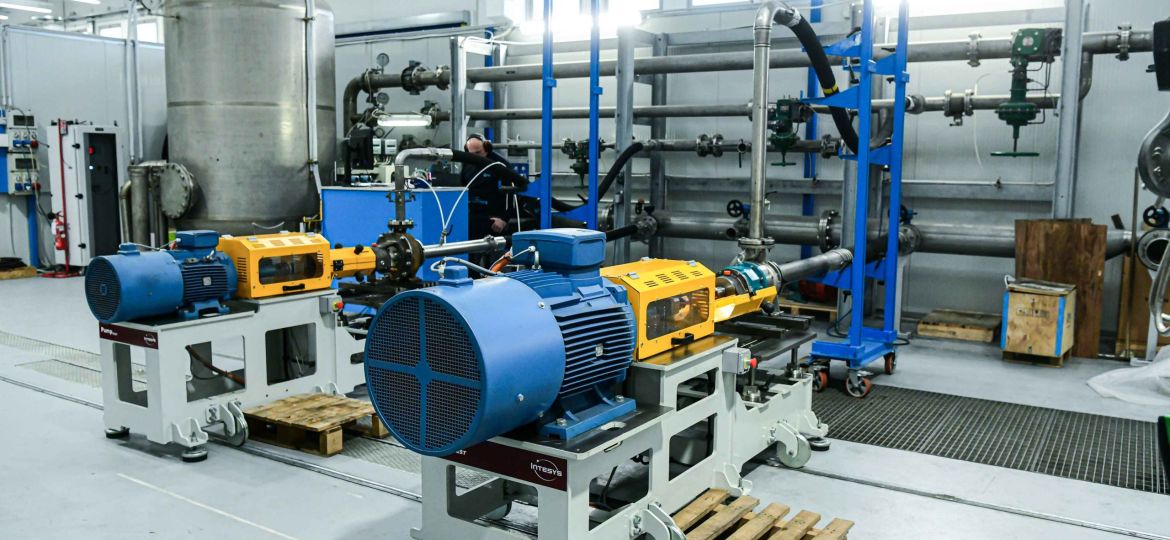
In the field of process engineering and fluid handling, the testing phase is crucial to ensure the efficiency, safety, and compliance of every supply. When it comes to process pumps designed for critical environments and complex production cycles, the option of witness tests becomes essential for plant engineers and end users.
The witness tests offered by CDR Pompe address this need with a transparent and collaborative approach involving all parties. The purpose of these tests is not merely to “see the product working” before delivery, but to verify its performance under real operating conditions, based on agreed parameters and supported by a qualified team. It is now an established practice that strengthens the trust between supplier and customer, allowing direct discussion and ensuring full traceability of every phase in the process.
Who Are Witness Tests For?
Witness tests are typically requested by two main types of stakeholders:
- End users, i.e., companies that will operate the pumps in their own facilities;
- Plant engineers, who integrate the pumps into complex systems commissioned by third parties.
In many cases, upon customer request, third-party certification bodies also participate in the witness tests. These entities are selected and appointed to verify the pump’s compliance with standards, technical specifications, or industry regulations. CDR’s role in such cases is that of a technical facilitator, coordinating the procedure, providing all necessary documentation, and ensuring that the tests are conducted in a controlled and professional environment.
Main Types of Witness Tests
The witness tests performed by CDR Pompe include a range of hydraulic, mechanical, and electrical checks essential for validating pump quality and compliance prior to delivery. Each test follows strict procedures, using calibrated instruments and under the supervision of specialized technical staff.
Depending on the customer’s or project’s specific requirements, multiple tests can often be combined to obtain a complete validation. Attending these tests ensures transparency, traceability, and—most importantly—full awareness of the pump’s actual performance under operational conditions.
Duty Point Testing
Duty point testing simulates the pump’s operation under the exact conditions defined by the project. Flow rate and head are precisely replicated to verify that the pump meets the required performance specifications. This is one of the most requested tests by plant engineers and end customers, particularly when operating conditions are critical or highly customized, as it helps identify any necessary adjustments and provides reliable parameters prior to commissioning.
This test is performed by default on all CDR pumps: once completed and passed, it is recorded in our system, and a copy of the results is always delivered with the pump.
5-Point Curve Test
The 5-point curve test measures the pump’s performance curve under five different flow conditions: minimum, intermediate, nominal, maximum, and overcapacity. This test evaluates head, efficiency, and power consumption relative to flow rate, providing a clear picture of the pump’s overall performance. It is useful to verify consistency with the design data, detect anomalies, and optimize the integration of the pump within an existing system.
Spark Test
The spark test is a non-destructive method used to verify the integrity of internal linings, especially for models lined with PFA or other anti-corrosive materials. By applying high electrical potential, any pinholes, discontinuities, or imperfections invisible to the naked eye are detected. This test is essential for applications in chemically aggressive environments, where the coating’s integrity ensures pump body protection and plant safety.
Pump Casing Hydrostatic Test
The hydrostatic test checks the structural integrity of the pump casing and its connections. The pump is sealed, filled with water, and subjected to a static pressure 1.5 times the maximum allowable working pressure—as per ISO 5199:2005—for a specified duration. During the test, any leaks, deformations, or structural failures are monitored. This is a mandatory test in many regulated industries and is particularly relevant for pumps handling hazardous, pressurized, or high-temperature fluids. A successful test confirms the mechanical strength and safety of the entire assembly.
NPSH Test
The NPSH (Net Positive Suction Head) test determines the pump’s ability to resist cavitation. During the test, suction pressure is gradually reduced until the minimum value is identified—below which cavitation occurs. This value, known as NPSHr (required), is compared to the design specifications to ensure an adequate safety margin. This is a technical test, conducted only on equipped test benches, and is especially important for critical applications with low suction head or vaporizing fluids.
Procedure, Traceability, and Technical Support
The entire witness testing process is managed with a structured and transparent approach: customers may request tests as early as the quotation stage, and such tests are formally included in the initial purchase order. The test date is scheduled in agreement with the customer after order confirmation, considering production timing and logistical needs.
During the witness test, the customer is accompanied by a CDR sales representative, the testing department manager, and the test bench operator, ensuring continuous support, technical dialogue, and full visibility of ongoing activities.
Any specific requests are always evaluated by the testing department to verify feasibility and, if necessary, integrate additional instruments or custom configurations.
Final Documentation and Legal Validity of Witness Tests
At the end of the tests, CDR Pompe provides the customer with official documentation including test results, graphs, measured data, operating conditions, and signatures of the technical personnel. This documentation can be used for:
- Internal project validation
- Compliance with contractual specifications
- On-site commissioning documentation
- External audits or certifications
Relying on CDR’s witness tests means adding an extra level of control, customization, and technical exchange that goes far beyond routine testing. It’s an opportunity—for both us and our customers—to share expertise, guarantee results, and deliver tailored, certified, and truly ready-to-use equipment.
For more information or to evaluate the feasibility of a witness test for your upcoming pumps, visit our website or request a dedicated consultation.